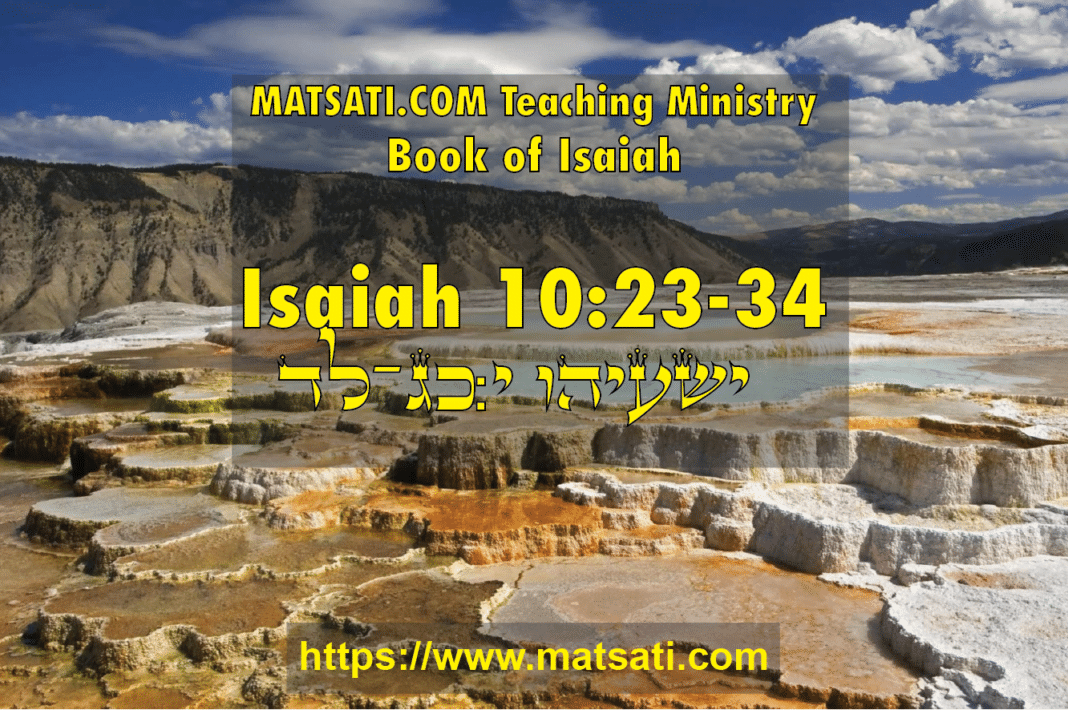Table of Contents
Introduction to Isaiah 10:23-34
King Solomon wrote according to Mishley / Proverbs 13:6 a fairly straightforward statement of a truth repeated in various ways, dozens of times throughout the book of Proverbs and all of the Bible. The idea is those who practice righteousness will ultimately succeed, while the sinfulness of the sinner will be his undoing.
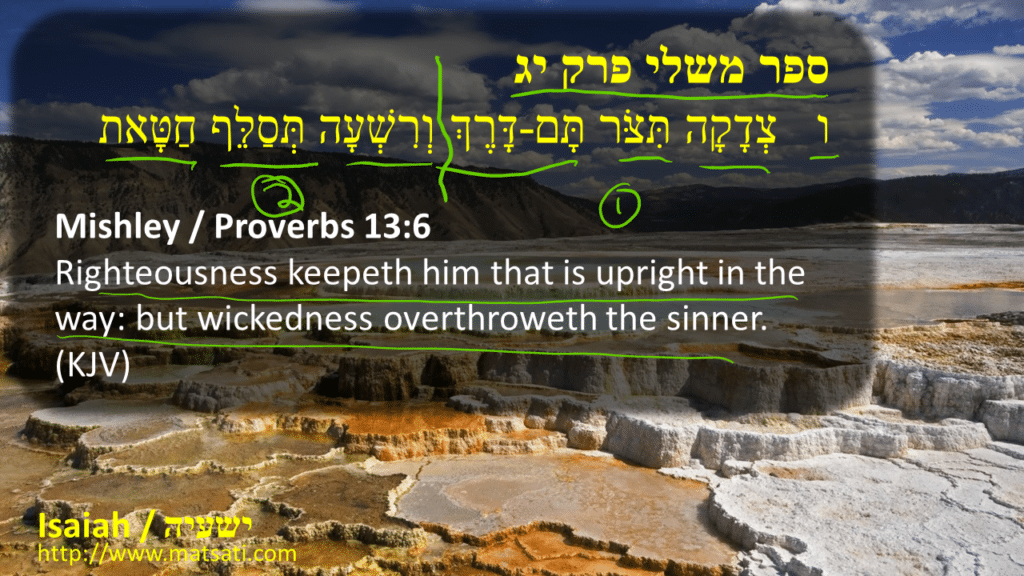
ספר משלי פרק יג
ו צְדָקָה תִּצֹּר תָּם-דָּרֶךְ וְרִשְׁעָה תְּסַלֵּף חַטָּאת:
Note the way Solomon composes this proverb draws out a few particular points. First, the emphasis in the first half of the sentence, צְדָקָה תִּצֹּר תָּם-דָּרֶךְ is how righteousness keeps watch making a man’s ways innocent. This is the idea that practicing righteousness shields a person from adversity (see also Mishey / Proverbs 2:11, 4:6, 13:3). A practitioner of God’s way of life is protected by the fact that he does what is right. If a person does good things, avoiding what is evil, he will be drawn into adverse situations far less frequently than those who dance on the edge of the cliff. The second half of the verse וְרִשְׁעָה תְּסַלֵּף חַטָּאת states that the wicked twist or misrepresent due to their sin. The sinful way of living offers a person no protection at all; the course of sin will run unchecked through his or her life all the way to its completion, which is death! (See James 1:14-15) Note that God allows a period of repentance so as to halt this sequence of events. We note that this is the course of the people of Israel in Isaiah’s day, the people living in sin, unrepentant, and their sins eating away at them to their destruction. (Ephesians 2:1-3). Isaiah describes God’s interaction in the lives of the people in the following way:
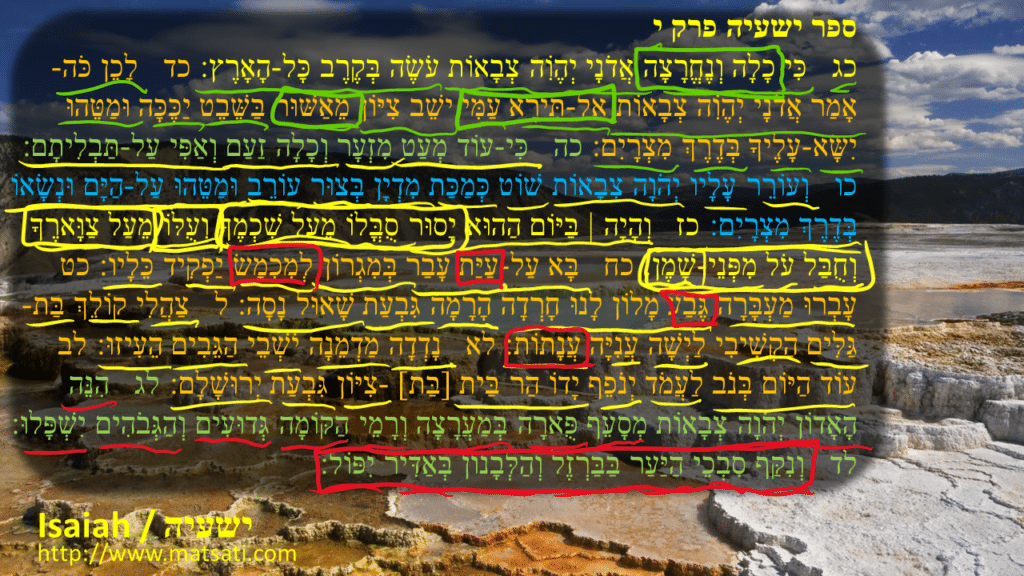
ספר ישעיה פרק י
כג כִּי כָלָה וְנֶחֱרָצָה אֲדֹנָי יְהֶוִֹה צְבָאוֹת עֹשֶֹה בְּקֶרֶב כָּל-הָאָרֶץ:
Isaiah 10:23 states, “For the Lord GOD of hosts shall make a consumption, (כִּי כָלָה וְנֶחֱרָצָה אֲדֹנָי יְהֶוִֹה צְבָאוֹת) even determined, in the midst of all the land. (עֹשֶֹה בְּקֶרֶב כָּל-הָאָרֶץ)” Here the Hebrew Bible speaks of God determining total destruction (כָלָה וְנֶחֱרָצָה). The KJV translates this as God making a consumption. At one point in history, the word consumption was a label given to a disease of unknown origin. Tuberculosis (TB) was popularly known as consumption for a long time. Scientists know it as an infection caused by M. tuberculosis. In 1882, the microbiologist Robert Koch discovered the tubercle bacillus, at a time when one of every seven deaths in Europe was caused by TB. Because antibiotics were unknown, the only means of controlling the spread of infection was to isolate patients in private sanitoria or hospitals limited to patients with TB. Note how the transmission was not well understood either, all the reason for isolation. Isaiah had just said there would remain a remnant of people, but destruction would come to most. We note that God’s promises to Abraham would be fulfilled (Bereshit / Genesis 22:17, 32:12). It was also believed that because of the promises they would be safe. (Luke 3:7-9) Even though there will remain a remnant, the Lord God has decreed their destruction due to their unrepentant sin.
ספר ישעיה פרק י
כד לָכֵן כֹּה-אָמַר אֲדֹנָי יְהֶוִֹה צְבָאוֹת אַל-תִּירָא עַמִּי ישֵׁב צִיּוֹן מֵאַשּׁוּר בַּשֵּׁבֶט יַכֶּכָּה וּמַטֵּהוּ יִשָּׂא-עָלֶיךָ בְּדֶרֶךְ מִצְרָיִם:
Isaiah 10:24 states, “Therefore thus saith the Lord GOD of hosts, (לָכֵן כֹּה-אָמַר אֲדֹנָי יְהֶוִֹה צְבָאוֹת) O my people that dwellest in Zion, be not afraid of the Assyrian: (אַל-תִּירָא עַמִּי ישֵׁב צִיּוֹן מֵאַשּׁוּר) he shall smite thee with a rod, (בַּשֵּׁבֶט יַכֶּכָּה) and shall lift up his staff against thee, after the manner of Egypt. (וּמַטֵּהוּ יִשָּׂא-עָלֶיךָ בְּדֶרֶךְ מִצְרָיִם)” Isaiah says that they should not fear Assyria because it will be in a similar manner to the way Egypt struck Israel. This could suggest that they survived Egyptian affliction and they will also survive Assyrian affliction. These things produce hope of the future restoration. The God we serve there is always hope, to believe, and to trust because our God is good. Even in the midst of punishment there is hope of God’s forgiveness and restoration if we repent and turn from our sins. What the Lord has revealed to us about Himself is that anything is possible, the Lord is the God of all creation, He is capable of doing anything, and the examples given us in the Scriptures are proof of His love for us based upon the promises that He has kept with His people.
ספר ישעיה פרק י
כה כִּי-עוֹד מְעַט מִזְעָר וְכָלָה זַעַם וְאַפִּי עַל-תַּבְלִיתָם:
Israel 10:25 states, “For yet a very little while, (כִּי-עוֹד מְעַט מִזְעָר) and the indignation shall cease, (וְכָלָה זַעַם) and mine anger in their destruction. (וְאַפִּי עַל-תַּבְלִיתָם)” This phrase literally says that “a little while and the destruction curse of my anger will be used up, or cease.” This may suggest that while there is a plan for blessing, if one lives in unrepentant sin, there is also a plan for destruction. The purpose of which is to draw one back to the Lord and His Holy and Righteous ways. Note that the wrath of God once it has run its course due to sin, it will turn to Assyria to exact judgment upon the king of Assyria and his people.
ספר ישעיה פרק י
כו וְעוֹרֵר עָלָיו יְהֹוָה צְבָאוֹת שׁוֹט כְּמַכַּת מִדְיָן בְּצוּר עוֹרֵב וּמַטֵּהוּ עַל-הַיָּם וּנְשָֹאוֹ בְּדֶרֶךְ מִצְרָיִם:
Isaiah 10:26 states, “And the LORD of hosts shall stir up a scourge for him according to the slaughter of Midian (וְעוֹרֵר עָלָיו יְהֹוָה צְבָאוֹת שׁוֹט כְּמַכַּת מִדְיָן) at the rock of Oreb: (בְּצוּר עוֹרֵב) and as his rod was upon the sea, so shall he lift it up after the manner of Egypt. (וּמַטֵּהוּ עַל-הַיָּם וּנְשָֹאוֹ בְּדֶרֶךְ מִצְרָיִם)” A few things are mentioned here, the rock of Orev (עֹרֵב, orev) is the place where Gideon killed Oreb after defeating the Midianites (see Judges 7:25, Isaiah 10:26). The Rod upon the sea is a reference to Moshe and the Red Sea and God’s treatment of Egypt at the sea. (Shemot / Exodus 14) Note that the slaughter of Midian, Gideon was stirred up by the Lord to destroy the idol god of Israel at that time (baal and ashtoroth) and then to take men and attack Midianites who were near. The Angel of the Lord commanded Gideon to do these things. And the power of God was present, just as it was present during the Red Sea event. Here in Gideon’s case, the Lord God had given dreams to the Midianites which showed them that Gideon was going to conquer them, they would be defeated and destroyed. When reading the narrative, it is interesting that there was a confusion on the blowing of the trumpets and the people attacked one another and fled. This confusion was given from God and was due to their sins! Note this is consistent with our previous conclusion, that a person who practices God’s way of life (righteousness and holiness) is protected by the fact that he does what is right. On the other hand, the sinful way of living offers a person no protection at all; the course of sin will run unchecked through his or her life all the way to its completion, which is death!
ספר ישעיה פרק י
כז וְהָיָה | בַּיּוֹם הַהוּא יָסוּר סֻבֳּלוֹ מֵעַל שִׁכְמֶךָ וְעֻלּוֹ מֵעַל צַוָּארֶךָ וְחֻבַּל עֹל מִפְּנֵי-שָׁמֶן:
Isaiah 10:27 states, “And it shall come to pass in that day, that his burden shall be taken away from off thy shoulder, (וְהָיָה | בַּיּוֹם הַהוּא יָסוּר סֻבֳּלוֹ מֵעַל שִׁכְמֶךָ) and his yoke from off thy neck, and the yoke shall be destroyed because of the anointing. (וְעֻלּוֹ מֵעַל צַוָּארֶךָ וְחֻבַּל עֹל מִפְּנֵי-שָׁמֶן)” This appears to be synonymous to the burden of slavery, similar to what we read in the previous verses of being struck by Assyria in similar way as the Egyptians. Here we read יָסוּר סֻבֳּלוֹ מֵעַל שִׁכְמֶךָ that the burden will be turned from the shoulder and וְעֻלּוֹ מֵעַל צַוָּארֶךָ the yoke from on your neck. The yoke will be destroyed from the face of the oil (וְחֻבַּל עֹל מִפְּנֵי-שָׁמֶן) which is translated as “because of the anointing” with the oil. Anointing (משח) people were often anointed in recognition of the Lord’s divine calling upon their lives. The anointing with oil was a physical recognition of their particular role or office of king, prophet, or priest. This suggests that the people are being brought back to the Land as promised by God, that redemption is coming.
ספר ישעיה פרק י
כח בָּא עַל-עַיַּת עָבַר בְּמִגְרוֹן לְמִכְמָשֹ יַפְקִיד כֵּלָיו: כט עָבְרוּ מַעְבָּרָה גֶּבַע מָלוֹן לָנוּ חָרְדָה הָרָמָה גִּבְעַת שָׁאוּל נָסָה: ל צַהֲלִי קוֹלֵךְ בַּת-גַּלִּים הַקְשִׁיבִי לַיְשָׁה עֲנִיָּה עֲנָתוֹת: לא נָדְדָה מַדְמֵנָה יֹשְׁבֵי הַגֵּבִים הֵעִיזוּ: לב עוֹד הַיּוֹם בְּנֹב לַעֲמֹד יְנֹפֵף יָדוֹ הַר בַּית [בַּת] -צִיּוֹן גִּבְעַת יְרוּשָׁלָם:
Isaiah 10:28 states, “He is come to Aiath, he is passed to Migron; (בָּא עַל-עַיַּת עָבַר בְּמִגְרוֹן) at Michmash he hath laid up his carriages: (לְמִכְמָשֹ יַפְקִיד כֵּלָיו)” Isaiah 10:29 “They are gone over the passage: (עָבְרוּ מַעְבָּרָה) they have taken up their lodging at Geba; (גֶּבַע מָלוֹן לָנוּ) Ramah is afraid; Gibeah of Saul is fled. (חָרְדָה הָרָמָה גִּבְעַת שָׁאוּל נָסָה)” Isaiah 10:30 “Lift up thy voice, O daughter of Gallim: (צַהֲלִי קוֹלֵךְ בַּת-גַּלִּים) cause it to be heard unto Laish, O poor Anathoth. (הַקְשִׁיבִי לַיְשָׁה עֲנִיָּה עֲנָתוֹת)” Isaiah 10:31 “Madmenah is removed; the inhabitants of Gebim gather themselves to flee. (נָדְדָה מַדְמֵנָה יֹשְׁבֵי הַגֵּבִים הֵעִיזוּ)” Isaiah 10:32 “As yet shall he remain at Nob that day: (עוֹד הַיּוֹם בְּנֹב לַעֲמֹד) he shall shake his hand against the mount of the daughter of Zion, the hill of Jerusalem. (יְנֹפֵף יָדוֹ הַר בַּית [בַּת] -צִיּוֹן גִּבְעַת יְרוּשָׁלָם)” Here Isaiah is tying a lot of different locations and events together in this sequence of verses. Aiath (עַיַּת) is Ai, one of the first town’s that Israel encountered when Joshua brought the people into the Land (see Joshua 8). This city is just east of Bethel (Bereshit / Genesis 12:8). Michmash (מִכְמָשׂ, mikhmas; מִכְמָס, mikhmas)is a town on the Benjamin-Judah border near Bethel and Jerusalem, east of Beth Aven. Michmash may mean “hidden place” (HALOT, s.v. “מִכְמָס, mikhmas”). Geba (גֶּבַע, geva’; Γαβαα, Gabaa) is a Levitical city located within the portion of land Joshua assigned to the tribe of Benjamin (Joshua 21:17). Biblical references to the city of Geba (with the spelling גֶּבַע, geva’) appear in Joshua 18:24, 21:17, 1 Samuel 13:3, 14:5, 1 Kings 15:22, 2 Kings 23:8, 1 Chronicles 8:6, 2 Chronicles 16:6, Ezra 2:26, Nehemiah 7:30, 11:31, 12:29, Isaiah 10:29, Zechariah 14:10. Gallim (גַּלִים, galim). The place of origin of Palti, to whom Saul gave his daughter Michal (1 Samuel 25:44). Also named in a prophetic woe oracle (Isaiah 10:30). Anathoth was a Levitical city in Benjamin, Joshua 21:18, 1 Chronicles 6:60. Abiathar was confined in 1 Kings 2:26. It was the birthplace of Jeremiah according to Jeremiah 1:1, 32:7-12, of Abiezer, 2 Samuel 23:27, of Jehu, 1 Chronicles 12:3. Prophecies against Jeremiah 11:21–23. Inhabitants after Babylonian captivity, Ezra 2:23, Nehemiah 7:27. Son of Becher, 1 Chronicles 7:8. And a Jew, who returned from Babylon according to Nehemiah 10:19. We note that John Oswalt states there is kind of a disjunctive connection here, meaning that there is a lack of a direct connection to the text to all of these places. John Oswalt continues saying, “Raman and Gibeah are outflanked. Gallim, Laishah, Anathoth, Madmenah, and Gebim lie directly in the path of the juggernaut as it makes the final march to the outskirts of Jerusalem on the following day. Although Nob has not been positively identified, it was probably in the vicinity of Mount Scopus northeast of Jerusalem. In a climactic gesture, the victorious enemy stands astride that high point and hurls taunts at Jerusalem. Obviously, nothing can save the city from such overwhelming force.” (Oswalt, J. N. (1986). The Book of Isaiah, Chapters 1–39 (pp. 273–275). Wm. B. Eerdmans Publishing Co.) it is interesting to note that Geba is the location that all of Israel fought against the sons of Belial according to Judges 20. The events according to judges 19-21 provide an interesting context to what is going on with Judah and Jerusalem. If we remember, the sons of Belial behaved in similar manner to the men of Sodom, in their wickedness they killed a concubine through sexual abuse. Then all of Israel came against the tribe of Benjamin due to his sin. The events that follow include war and the refusal of all the tribes of Israel to give Benjamin daughters in marriage because of their sin and refusing to turn over the sons of Belial. The name Belial (בְלִיַּעַל) is a Hebrew word that is used as a label for the wicked or worthless. The etymology of the word is often understood as “lacking worth,” derived from two common words: בְּלִי “without-“ and יָעַל “to be of value.” Do some translate this word to mean “worthless” or “having no worth.” This word occurs twenty-seven times in the Masoretic Text, in verses such as Mishley / Proverbs 6:12. In the Hebrew Bible, the phrase is usually written as “sons of Belial.” Of these 27 occurrences, the idiom “sons of Belial” (בְּנֵֽי־בְלִיַּעַל) appears 15 times to indicate worthless people, including idolaters (Devarim / Deuteronomy 13:13), the men of Gibeah (Judges 19:22, 20:13), the sons of Eli (1 Samuel 2:12), Nabal, and Shimei. We note that those who are labeled as the sons of Belial are those who have no regard for God’s Torah, promoting sexual sin and idolatry. This is why Paul compared them to Godly men saying, 2 Corinthians 6:15 What harmony is there between Christ and Belial? (NIV) The sinfulness of Geba parallels the people in Isaiah’s day and is what has led to the destruction of Judah and Jerusalem.
ספר ישעיה פרק י
לג הִנֵּה הָאָדוֹן יְהֹוָה צְבָאוֹת מְסָעֵף פֻּארָה בְּמַעֲרָצָה וְרָמֵי הַקּוֹמָה גְּדוּעִים וְהַגְּבֹהִים יִשְׁפָּלוּ: לד וְנִקַּף סִבְכֵי הַיַּעַר בַּבַּרְזֶל וְהַלְּבָנוֹן בְּאַדִּיר יִפּוֹל:
Isaiah 10:33 states, “Behold, the Lord, the LORD of hosts, (הִנֵּה הָאָדוֹן יְהֹוָה צְבָאוֹת) shall lop the bough with terror: (מְסָעֵף פֻּארָה בְּמַעֲרָצָה) and the high ones of stature shall be hewn down, (וְרָמֵי הַקּוֹמָה גְּדוּעִים) and the haughty shall be humbled. (וְהַגְּבֹהִים יִשְׁפָּלוּ)” Isaiah 10:34 “And he shall cut down the thickets of the forest with iron, (וְנִקַּף סִבְכֵי הַיַּעַר בַּבַּרְזֶל) and Lebanon shall fall by a mighty one. (וְהַלְּבָנוֹן בְּאַדִּיר יִפּוֹל)” Very quickly destruction will come, and the army of Assyria will accomplish what God had intended. The idea וְרָמֵי הַקּוֹמָה גְּדוּעִים וְהַגְּבֹהִים יִשְׁפָּלוּ “the high ones of stature shall be hewn down, and the haughty shall be humbled” means that all pride is subject to the Lord God Almighty and will not go unpunished, which means that the Lord judges all men equally. We remember that these things teach us that there are no partial sinners. One is either righteous or sinful. James writes saying it this way, if we break one command, we have broken them all. (James 2:10-11) Yeshua speaking both to His disciples and to the people, calls them “evil” (see Matthew 7:11, 12:34). Paul writes of all humanity, “For all have sinned and fallen short of the glory of God” (Romans 3:23). James distills it even further saying simply that we all stumble (James 3:2). The point is each time we sin we need the grace and mercy of God. This is why we need the Lord in our lives, especially God’s Son Yeshua the Messiah as He laid His life down on our behalf shedding His blood for the forgiveness of sins. The lessons that we learn from these things is to repent, to believe and to seek the Lord’s help to overcome and help us to walk according to the spirit and do what is right according to God’s Word. We are not called to dance along the edge of the cliff, but to live by faith and not play around with evil.
Rabbinic Commentary on Isaiah 10:23-34
The Targum Jonathan is an Aramaic and rabbinic interpretation of the book of Isaiah.
תרגום יונתן בן עוזיאל אל ישעיה פרק ט:כג-לד
כג אְרֵי גְמֵירָא וְשֵיצָאָה יוי אְלֹהִים צְבָאֹות עָבֵיד עִם כָל רַשִיעֵי אַרעָא׃ כד בְכֵין כִדְנָן אְמַר יוי אְלֹהִים צְבָאֹות לָא תִדחַל עַמִי יָתֵיב צִיֹון מֵאַתוּרָאָה בְשוּלטָניֵה יִמחֵינָך וְמַרוְתֵיה יִטֹול עְלָך כִיד בְאֹורַח מִצרָיִם׃ כה אְרֵי עֹוד צִיב חַד כִזעֵיר וִיסוּפוּן לְוָטַיָא מִינְכֹון דְבֵית יַעְקֹב וְרֻגזִי עַל עַמְמַיָא עָבְדֵי תַכלָא לְשֵיצָיוּתְהֹון׃ כו וְיַיתֵי עְלֹוהִי יוי צְבָאֹות מַחָא כְמַחַת מִדיָן בִשקֵיף עֹורֵב וּמַחְתֵיה תִעדֵי מִינְכֹון כְמָא דַעְדָת מִינְכֹון מַרוַת פַרעֹה עַל יַמָא וְיִתעַבדָן לְכֹון גְבוּרָן כִיד באֹורַח מִצרָיִם׃ כז וִיהֵי בְעִידָנָא הַהוּא תִעדֵי מַחְתֵיה מִינָך וְנִירֵיה מְעַל צַורָך וְיִתַברוּן עַמְמַיָא מִן קֳדָם מְשִיחָא׃ כח אְתָא עַל עַיַת עְבַר בְמִגרֹון לְמִכמַש יְמַנֵי רַבָנֵי מַשרְיָתֵיה׃ כט גַזוּ עְבַרוּ יַרדְנָא בְגַבַע בָתוּ לְהֹון אִיתְבַרוּ יָתְבֵי רָמָתָא אְנָש גִבעַת שָאוּל עְרַקוּ׃ ל אְרִימוּ קָלְכֹון אְנָש בַת גַלִים אַצִיתוּ דְיָתְבִין בְלַיִש דְדָיְרִין בַעְנִיָה עְנָתֹות׃ לא אִיתְבַרוּ אְנָש מַדמֵנָה יָתְבֵי גֵבִים גְלֹו׃ לב עַד כְעַן יֹומָא רַב וְסַגִי עִידָן לֵיה לְמֵיעַל וְהָא סַנחְרִיב מַלכָא דְאַתוּר נְטַל וַעְבַד תְלָת אַונִין וּדבַר עִמֵיה אַרבְעִין אַלפִין גֻספָנִין דִדהַב דִבנֵי מַלכִין קְטִירֵי תַאגָא יָתְבִין בְהֹון וּדבַר עִמֵיה מָתַן וְשִתִין אַלפִין אָחִידֵי סֵיפִין וְרֻמחִין וּדבַר עִימֵיה מָאתַן וְשִיתִין אַלפִין מְחָצְצֵי גִרִין דְרָהְטִין קֳדָמֹוהִי מְאָה אַלפִין אַמִין אַרכָא דְמַשרִיָתֵיה אַרבַע מְאָה פַרסִין צַוַאר סוּסָוָתֵיה אַרבְעִין פַרסִין מִניַן מַשרִיָתֵיה מָתַן וְשִתִין אַלפִין רִבֹוא חָסֵר חַד וְכֵין אְתָא עַל אַברָהָם אְבוּנָא כַד רְמֹו יָתֵיה לְגֹו אַתוּן נוּרָא יַקֵדתָא וְכֵין עְתִידִין לְמֵיתֵי עִם גֹוג וּמָגֹוג כַד יִשלֵים עָלְמָא קִצֵיה לְאִתפַרָקָא מַשרִיָתָא קַדמַיָתָא כַד עְבַרוּ בְיַרדְנָא שְתֹו מַיָא דַהְוָה בְיַרדְנָא מַשרִיתָא תִניֵיתָא כַד עְבַרוּ בְיַרדְנָא דְלֹו עִקבֵי סוּסָוָתָא וּשתֹו מַיָא מַשרִיתָא תְלִתֵיתָא לָא אַשכַחוּ מַיָא לְמִשתֵי חְפַרוּ בֵירִין וּשתֹו מַיָא אְתָא וְקָם בְנֹוב קִריָת כָהְנַיָא לָקֳבֵיל שוּרָא דִירוּשלַם עָנֵי וְאָמַר לְחֵילָוָתֵיה הְלָא דָא הִיא יְרוּשלַם דִי עְלַה אַרגֵישִית כָל מַשרְיָתִי וַעְלַה כַבֵישִית כָל מְדִינָתִי הָא הִיא חַלָשָא מִכָל כַרכֵי עַמְמַיָא דְכַבֵישִית בִתקֹוף יְדַי עְלַה קָם מְנִיד בְרֵישֵיה מֹובֵיל וּמֵיתֵי בִידֵיה עַל טוּר בֵית מַקדְשָא דִבצִיֹון וְעַל עַזרָתָא דְבִירוּשלַם׃ עד כען יומא רב וסגי עידן ליה למיעל הא סנחריב מלכא דאתור נטל ועבד תלתא אוונין ודבר עמיה ארבע אלפין דבני מלכין קיטרי תגא דיתבין בהון ודבר עימיה מאתן אלפין אחידי סייפין ורומחין גברין דרהטין קדמוהי מאה אלפין מניין משרייתיה מאתן ושיתין אלפין ריבוא חסר חד אורכא דמשרייתיה ארבע מאה פרסין משריתא קדמאה כד עברו בירדנא שתו מיא דהוו בירדנא משריתא תניינא כד עברו בירדנא דלו בעקבי סוסותהון ושתו מיא משריתא תליתאה כד עברו בירדנא לא אשכחו מיא וחפרו בארין ושתו מיא אתא וקם בנוב קירית כהנא לקבל שורא דבירושלם עני וכן אמר לחלוותיה הלא דא היא קרתא דבירושלם דעלה ארגישית ית כל מדינתי ועלה כבישית ית כל משרייתי הלא היא זעירא וחלשא מכל כרכי עממיא דכבישית בתקוף ידי עלה וקם ונניד ברישיה מובל ומייתי בידיה על בית מקדשא דבציון ודבירושלם על עזרתא לג הָא רִבֹון עָלְמָא יוי צְבָאֹות רָמֵי קְטֹול בְמַשרְיָתיֵה כִבעֹוט דְמִתבְעֵיט בְמַעצְרָא וְרָמֵי קֹומָא יִתקַטפוּן וְתַקִיפַיָא יִמאְכוּן׃ חלף דאיתרברב סנחריב מלכא דאתור הא ריבון עלמא ייי צבאות רמי קטול במשריתיה כבעוט דמבעט במעצרת ורמי קומא יתקטפון ותקיפא ימאכון לד וִיקַטֵיל גִיבָרֵי מַשרְיָתֵיה דְמִתגַבְרִין בְבַרזְלָא וְעָבְדֵי קְרָבֵיה עַל אַרעָא דְיִשׂרָאֵל יִתרְמֹון׃
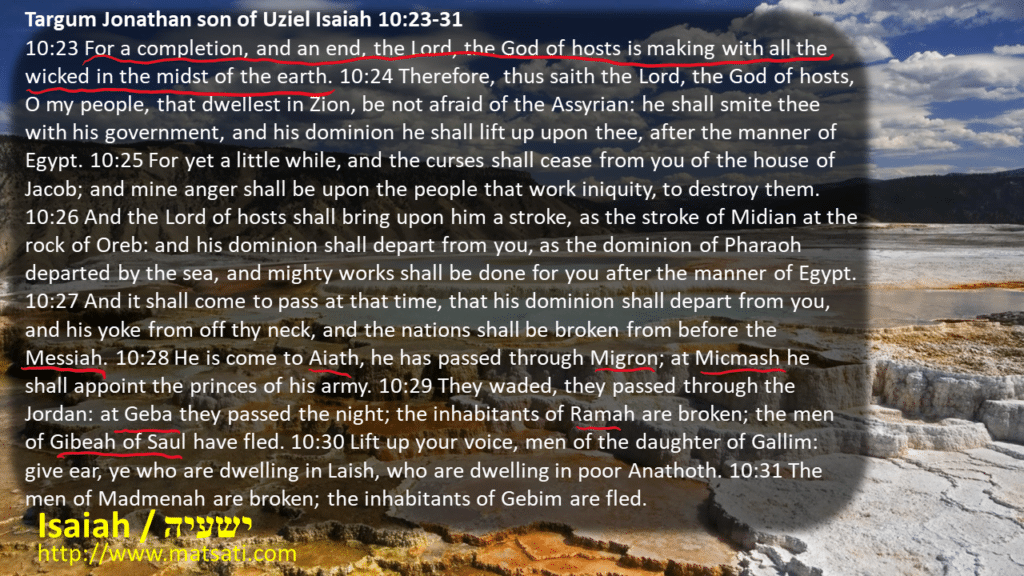
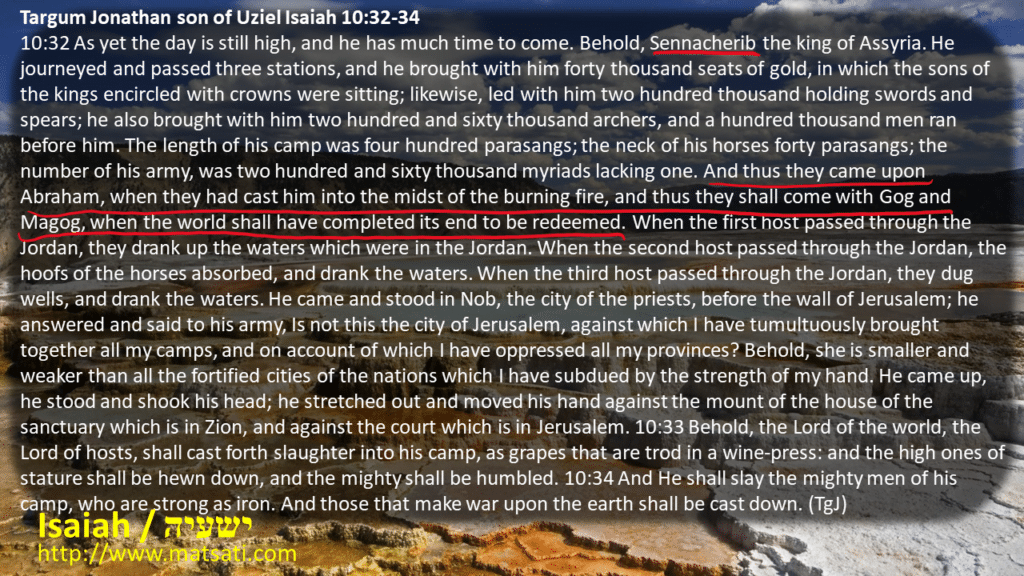
Targum Jonathan son of Uziel Isaiah 10:23-34
10:23 For a completion, and an end, the Lord, the God of hosts is making with all the wicked in the midst of the earth. 10:24 Therefore, thus saith the Lord, the God of hosts, O my people, that dwellest in Zion, be not afraid of the Assyrian: he shall smite thee with his government, and his dominion he shall lift up upon thee, after the manner of Egypt. 10:25 For yet a little while, and the curses shall cease from you of the house of Jacob; and mine anger shall be upon the people that work iniquity, to destroy them. 10:26 And the Lord of hosts shall bring upon him a stroke, as the stroke of Midian at the rock of Oreb: and his dominion shall depart from you, as the dominion of Pharaoh departed by the sea, and mighty works shall be done for you after the manner of Egypt. 10:27 And it shall come to pass at that time, that his dominion shall depart from you, and his yoke from off thy neck, and the nations shall be broken from before the Messiah. 10:28 He is come to Aiath, he has passed through Migron; at Micmash he shall appoint the princes of his army. 10:29 They waded, they passed through the Jordan: at Geba they passed the night; the inhabitants of Ramah are broken; the men of Gibeah of Saul have fled. 10:30 Lift up your voice, men of the daughter of Gallim: give ear, ye who are dwelling in Laish, who are dwelling in poor Anathoth. 10:31 The men of Madmenah are broken; the inhabitants of Gebim are fled. 10:32 As yet the day is still high, and he has much time to come. Behold, Sennacherib the king of Assyria. He journeyed and passed three stations, and he brought with him forty thousand seats of gold, in which the sons of the kings encircled with crowns were sitting; likewise, led with him two hundred thousand holding swords and spears; he also brought with him two hundred and sixty thousand archers, and a hundred thousand men ran before him. The length of his camp was four hundred parasangs; the neck of his horses forty parasangs; the number of his army, was two hundred and sixty thousand myriads lacking one. And thus they came upon Abraham, when they had cast him into the midst of the burning fire, and thus they shall come with Gog and Magog, when the world shall have completed its end to be redeemed. When the first host passed through the Jordan, they drank up the waters which were in the Jordan. When the second host passed through the Jordan, the hoofs of the horses absorbed, and drank the waters. When the third host passed through the Jordan, they dug wells, and drank the waters. He came and stood in Nob, the city of the priests, before the wall of Jerusalem; he answered and said to his army, Is not this the city of Jerusalem, against which I have tumultuously brought together all my camps, and on account of which I have oppressed all my provinces? Behold, she is smaller and weaker than all the fortified cities of the nations which I have subdued by the strength of my hand. He came up, he stood and shook his head; he stretched out and moved his hand against the mount of the house of the SANCTUARY, which is in Zion, and against the court which is in Jerusalem. 10:33 Behold, the Lord of the world, the Lord of hosts, shall cast forth slaughter into his camp, as grapes that are trod in a wine-press: and the high ones of stature shall be hewn down, and the mighty shall be humbled. 10:34 And He shall slay the mighty men of his camp, who are strong as iron. And those that make war upon the earth shall be cast down. (TgJ)
We note this truth in the TgJ on Isaiah 10:23 which states, כג אְרֵי גְמֵירָא וְשֵיצָאָה יוי אְלֹהִים צְבָאֹות עָבֵיד עִם כָל רַשִיעֵי אַרעָא׃ 10:23 For a completion, and an end, the Lord, the God of hosts is making with all the wicked in the midst of the earth. (TgJ) The Targum translates as God going to bring an end to the wicked. This is reminiscent of Revelation 20:10 The devil, who deceived them, was cast into the lake of fire and brimstone where the beast and the false prophet are. And they will be tormented day and night forever and ever. The wicked shall be destroyed forever. (NIV) The prophecy of Joel speaks of the harvest for the wickedness of the gentiles is great.
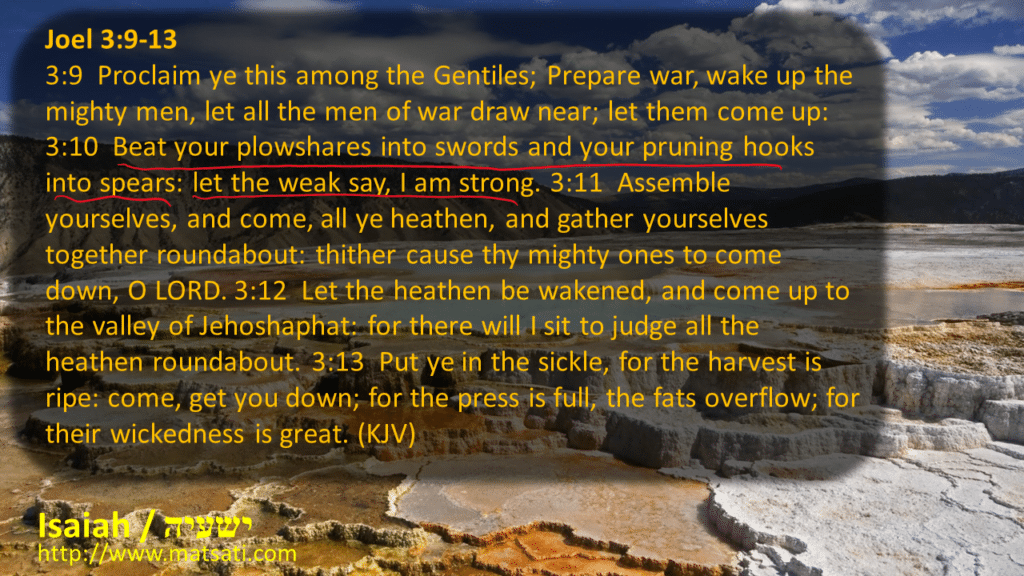
Joel 3:9-13
3:9 Proclaim ye this among the Gentiles; Prepare war, wake up the mighty men, let all the men of war draw near; let them come up: 3:10 Beat your plowshares into swords and your pruning hooks into spears: let the weak say, I am strong. 3:11 Assemble yourselves, and come, all ye heathen, and gather yourselves together roundabout: thither cause thy mighty ones to come down, O LORD. 3:12 Let the heathen be wakened, and come up to the valley of Jehoshaphat: for there will I sit to judge all the heathen roundabout. 3:13 Put ye in the sickle, for the harvest is ripe: come, get you down; for the press is full, the fats overflow; for their wickedness is great. (KJV)
These things speak of the escotological war and echo Isaiah 63:1-6.
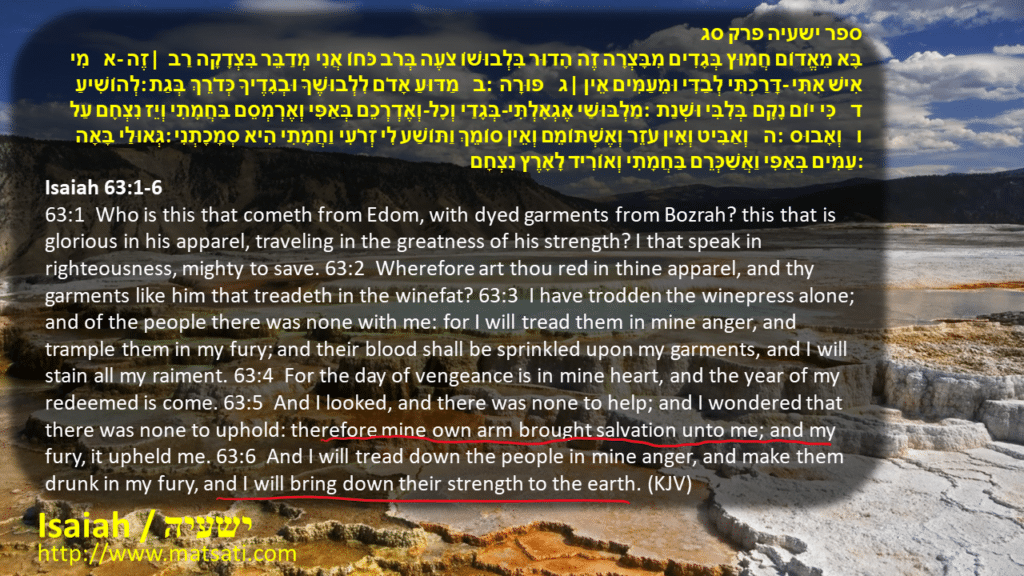
ספר ישעיה פרק סג
א מִי-זֶה | בָּא מֵאֱדוֹם חֲמוּץ בְּגָדִים מִבָּצְרָה זֶה הָדוּר בִּלְבוּשׁוֹ צֹעֶה בְּרֹב כֹּחוֹ אֲנִי מְדַבֵּר בִּצְדָקָה רַב לְהוֹשִׁיעַ: ב מַדּוּעַ אָדֹם לִלְבוּשֶׁךָ וּבְגָדֶיךָ כְּדֹרֵךְ בְּגַת: ג פּוּרָה | דָּרַכְתִּי לְבַדִּי וּמֵעַמִּים אֵין-אִישׁ אִתִּי וְאֶדְרְכֵם בְּאַפִּי וְאֶרְמְסֵם בַּחֲמָתִי וְיֵז נִצְחָם עַל-בְּגָדַי וְכָל-מַלְבּוּשַׁי אֶגְאָלְתִּי: ד כִּי יוֹם נָקָם בְּלִבִּי וּשְׁנַת גְּאוּלַי בָּאָה: ה וְאַבִּיט וְאֵין עֹזֵר וְאֶשְׁתּוֹמֵם וְאֵין סוֹמֵךְ וַתּוֹשַׁע לִי זְרֹעִי וַחֲמָתִי הִיא סְמָכָתְנִי: ו וְאָבוּס עַמִּים בְּאַפִּי וַאֲשַׁכְּרֵם בַּחֲמָתִי וְאוֹרִיד לָאָרֶץ נִצְחָם:
Isaiah 63:1-6
63:1 Who is this that cometh from Edom, with dyed garments from Bozrah? this that is glorious in his apparel, traveling in the greatness of his strength? I that speak in righteousness, mighty to save. 63:2 Wherefore art thou red in thine apparel, and thy garments like him that treadeth in the winefat? 63:3 I have trodden the winepress alone; and of the people there was none with me: for I will tread them in mine anger, and trample them in my fury; and their blood shall be sprinkled upon my garments, and I will stain all my raiment. 63:4 For the day of vengeance is in mine heart, and the year of my redeemed is come. 63:5 And I looked, and there was none to help; and I wondered that there was none to uphold: THEREFORE, mine own arm brought salvation unto me; and my fury, it upheld me. 63:6 And I will tread down the people in mine anger, and make them drunk in my fury, and I will bring down their strength to the earth. (KJV)
Here the Lord God is telling us in advance what is going to happen. This harvesting of the wicked is consistent with other Scripture, such as Jeremiah 25:15, 25:28-31, and Jeremiah 51:33, Hosea 6:11. We also read Yeshua providing a parable (the wheat and the tares) and of the Father in heaven and His judgment. (Matthew 13:39-42, Mark 4:29) The simple reason for the Lord telling us all these things is that He has given us this information so we can understand His plans. He wants us to know where sin came from and where it is going. God wants His children to align Bible history with Bible prophecy so that we can see and understand His love for us. The conclusion of Revelation reveals to us the wicked loose, and are defeated at the hands of the Lamb of God, who is the Messiah Yeshua! We note how what we have been studying here in Isaiah, the consequences of sin, and ultimately of the coming Messianic King, the Lord God will deliver His people, but only after their repentance from sin. Rashi states the following concerning these verses:
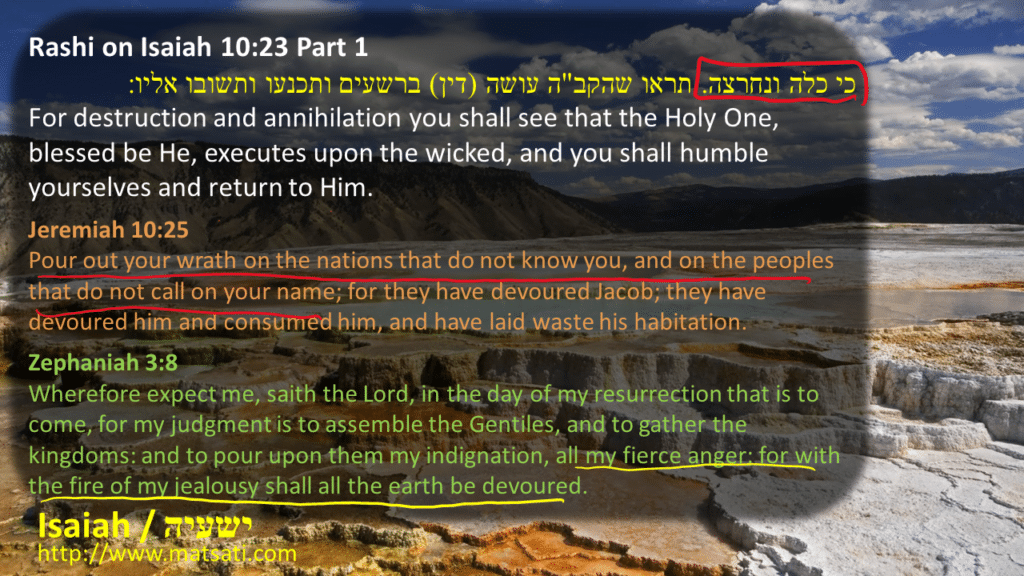
Rashi on Isaiah 10:23 Part 1
כי כלה ונחרצה. תראו שהקב”ה עושה (דין) ברשעים ותכנעו ותשובו אליו:
For destruction and annihilation you shall see that the Holy One, blessed be He, executes upon the wicked, and you shall humble yourselves and return to Him
Rashi points out the destruction and annihilation are meant to humble and lead to repentance. The point is that we can always receive direction from the Lord God in heaven, His will is for our repentance. If we seek and search for Him with all of our heart, all of our being, and not withhold anything from Him, we will find Him. The only place of safety is to be in the will of God and live our lives for His glory. If one is not at this point in their lives, then the very first thing one needs to do is repent and turn from his or her sin seeking the Lord’s help to do so. This is the only thing that is going to bring God’s protection and revelation into our lives. This means that we are to have Kavanah, which is the Hebrew word for direction, intention, or purpose in our lives. That purpose is to be intentional to seek the Lord God in heaven and His Messiah Yeshua. It is only then that we are able to walk in victory with His peace in our hearts, and live in joy and love towards one another no matter what is happening in this world.
Isaiah according to the TgJ states the following, כד בְכֵין כִדְנָן אְמַר יוי אְלֹהִים צְבָאֹות לָא תִדחַל עַמִי יָתֵיב צִיֹון מֵאַתוּרָאָה בְשוּלטָניֵה יִמחֵינָך וְמַרוְתֵיה יִטֹול עְלָך כִיד בְאֹורַח מִצרָיִם׃ 10:24 Therefore, thus saith the Lord, the God of hosts, O my people, that dwellest in Zion, be not afraid of the Assyrian: he shall smite thee with his government, and his dominion he shall lift up upon thee, after the manner of Egypt. כה אְרֵי עֹוד צִיב חַד כִזעֵיר וִיסוּפוּן לְוָטַיָא מִינְכֹון דְבֵית יַעְקֹב וְרֻגזִי עַל עַמְמַיָא עָבְדֵי תַכלָא לְשֵיצָיוּתְהֹון׃ 10:25 For yet a little while, and the curses shall cease from you of the house of Jacob; and mine anger shall be upon the people that work iniquity, to destroy them. כו וְיַיתֵי עְלֹוהִי יוי צְבָאֹות מַחָא כְמַחַת מִדיָן בִשקֵיף עֹורֵב וּמַחְתֵיה תִעדֵי מִינְכֹון כְמָא דַעְדָת מִינְכֹון מַרוַת פַרעֹה עַל יַמָא וְיִתעַבדָן לְכֹון גְבוּרָן כִיד באֹורַח מִצרָיִם׃ 10:26 And the Lord of hosts shall bring upon him a stroke, as the stroke of Midian at the rock of Oreb: and his dominion shall depart from you, as the dominion of Pharaoh departed by the sea, and mighty works shall be done for you after the manner of Egypt. (TgJ) This idea of the Lord bringing destruction upon the people who work iniquity. We note the parallels to what is written elsewhere in the Scriptures:
Jeremiah 10:25
Pour out your wrath on the nations that do not know you, and on the peoples that do not call on your name; for they have devoured Jacob; they have devoured him and consumed him, and have laid waste his habitation.
Zephaniah 3:8
Wherefore expect me, saith the Lord, in the day of my resurrection that is to come, for my judgment is to assemble the Gentiles, and to gather the kingdoms: and to pour upon them my indignation, all my fierce anger: for with the fire of my jealousy shall all the earth be devoured.
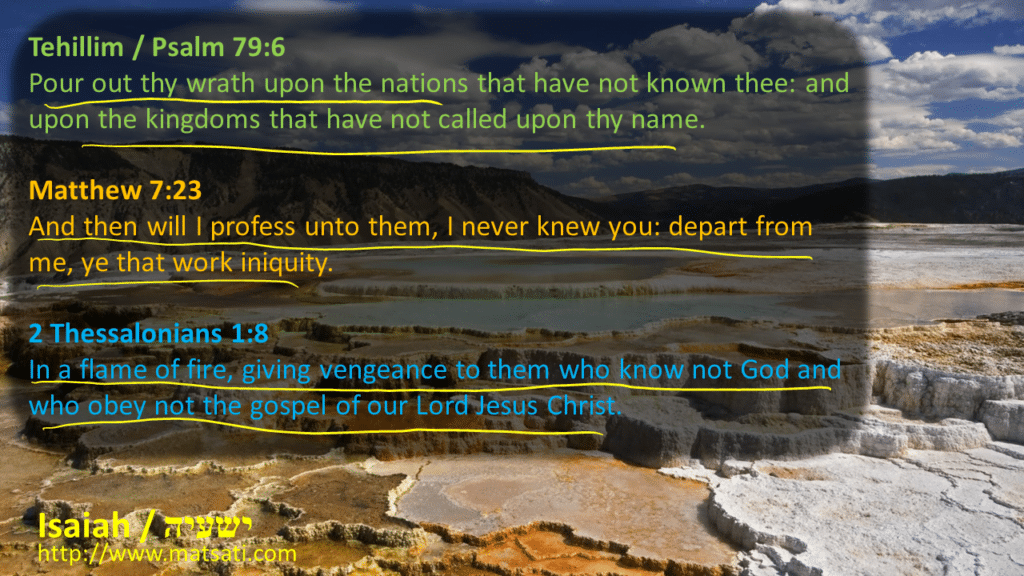
Tehillim / Psalm 79:6
Pour out thy wrath upon the nations that have not known thee: and upon the kingdoms that have not called upon thy name.
Matthew 7:23
And then will I profess unto them, I never knew you: depart from me, ye that work iniquity.
2 Thessalonians 1:8
In a flame of fire, giving vengeance to them who know not God and who obey not the gospel of our Lord Jesus Christ.
Paul wrote according to Romans 1:8 saying, “For the wrath of God is revealed from heaven against all ungodliness and unrighteousness of men, who suppress the truth in unrighteousness.” Wrath is the vengeance that God sends upon all forms of wickedness. In the Torah we read the following according to Shemot / Exodus 22:19-24.
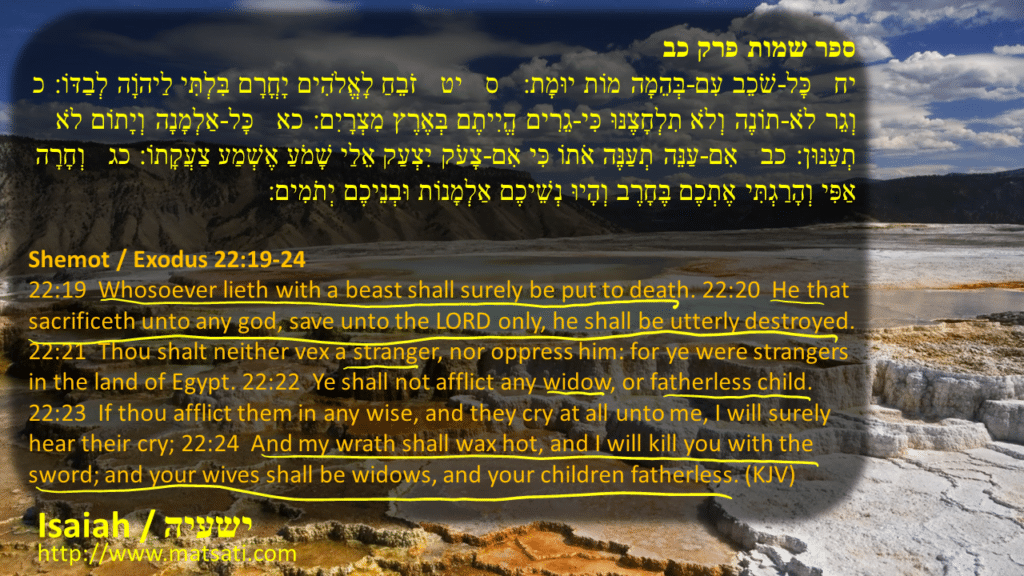
ספר שמות פרק כב
יח כָּל-שֹׁכֵב עִם-בְּהֵמָה מוֹת יוּמָת: ס יט זֹבֵחַ לָאֱלֹהִים יָחֳרָם בִּלְתִּי לַיהוָֹה לְבַדּוֹ: כ וְגֵר לֹא-תוֹנֶה וְלֹא תִלְחָצֶנּוּ כִּי-גֵרִים הֱיִיתֶם בְּאֶרֶץ מִצְרָיִם: כא כָּל-אַלְמָנָה וְיָתוֹם לֹא תְעַנּוּן: כב אִם-עַנֵּה תְעַנֶּה אֹתוֹ כִּי אִם-צָעֹק יִצְעַק אֵלַי שָׁמֹעַ אֶשְׁמַע צַעֲקָתוֹ: כג וְחָרָה אַפִּי וְהָרַגְתִּי אֶתְכֶם בֶּחָרֶב וְהָיוּ נְשֵׁיכֶם אַלְמָנוֹת וּבְנֵיכֶם יְתֹמִים:
Shemot / Exodus 22:19-24
22:19 Whosoever lieth with a beast shall surely be put to death. 22:20 He that sacrificeth unto any god, save unto the LORD only, he shall be utterly destroyed. 22:21 Thou shalt neither vex a stranger, nor oppress him: for ye were strangers in the land of Egypt. 22:22 Ye shall not afflict any widow, or fatherless child. 22:23 If thou afflict them in any wise, and they cry at all unto me, I will surely hear their cry; 22:24 And my wrath shall wax hot, and I will kill you with the sword; and your wives shall be widows, and your children fatherless. (KJV)
Note the grouping of these things, sexual sin, sacrificing to other gods, the oppression of the stranger, the fatherless, the widow, the wrath of God (וְחָרָה אַפִּי) will come upon such who do these things. These are consistent with what we read according to the NT text as well, God warns about the mistreatment of others, and earmarks the severity of how the Lord God views sin. As God warned Adam, “on the day that you eat of this tree, you will surely die” (Bereshit / Genesis 2:17). Death entered the world through Adam’s one sin (Romans 5:12) and sin has always brought about the holy wrath of God. The Lord does however provide us the opportunity to repent and turn from sin and to seek Him and His Messiah Yeshua. This is the mercy and grace of God to do these things. Rashi writes the following concerning Isaiah 10:26.
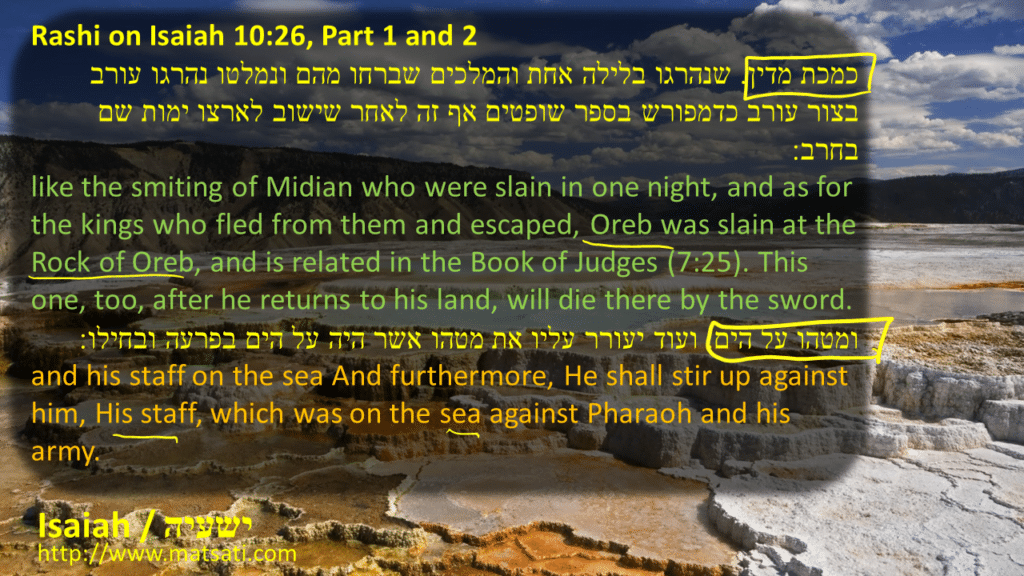
Rashi on Isaiah 10:26, Part 1 and 2
כמכת מדין. שנהרגו בלילה אחת והמלכים שברחו מהם ונמלטו נהרגו עורב בצור עורב כדמפורש בספר שופטים אף זה לאחר שישוב לארצו ימות שם בחרב:
like the smiting of Midian who were slain in one night, and as for the kings who fled from them and escaped, Oreb was slain at the Rock of Oreb, and is related in the Book of Judges (7:25). This one, too, after he returns to his land, will die there by the sword.
ומטהו על הים. ועוד יעורר עליו את מטהו אשר היה על הים בפרעה ובחילו:
and his staff on the sea And furthermore, He shall stir up against him, His staff, which was on the sea against Pharaoh and his army.
We note how Rashi draws the connection to the book of Judges and the wickedness of the people in that time such as the sons of Belial are those who have no regard for God’s Torah, promoting sexual sin and idolatry. (Judges 20) We also see how Eli’s sons who were priests in the Tabernacle, were also called the sons of Belial because of their wickedness before God. Note that sacrifice and sexual sin was involved in this instance as well. The sinfulness of the men in Geba parallels the people in Isaiah’s day and is what has led to the destruction of Judah and Jerusalem. The outcome of sin and sinful lifestyles has not changed today. If we do not repent, and do not seek the Messiah, we will be lost. This is how the TgJ notes victory in the Messiah saying the following, כז וִיהֵי בְעִידָנָא הַהוּא תִעדֵי מַחְתֵיה מִינָך וְנִירֵיה מְעַל צַורָך וְיִתַברוּן עַמְמַיָא מִן קֳדָם מְשִיחָא׃ 10:27 And it shall come to pass at that time, that his dominion shall depart from you, and his yoke from off thy neck, and the nations shall be broken from before the Messiah. (TgJ) Here both dominion and the yoke will depart from off the neck. The removal of the burden / yoke of sin and bondage here is an interesting parallel to these things which happen “before the Messiah” קֳדָם מְשִיחָא (in His presence). First, the Messiah came to save his people from the wrath of God. We note according to Matthew 3:7 and Luke 3:7 John the Baptist warned of the wrath to come. We also note that Yesbua spoke regularly about the wrath of God. For example, he talked about the “hell of fire” (Matthew 5:22), the “eternal fire” (Matthew 18:8), and a place where the “worm does not die, and the fire is not quenched” (Mark 9:48). Remember what Yeshua says according to John 3:36 concerning salvation in the Son is set in direct contrast to God’s wrath, “Whoever believes in the Son has eternal life; whoever does not obey the Son shall not see life, but the wrath of God remains on him.” We note that major sections of the NT speak of God’s wrath, such as Paul writing that unrepentant sinners are given a deprived mind (Romans 1:24-28). The point is that God’s wrath focuses upon punishing sin, consistent with what we are reading here in the book of Isaiah. God is the same yesterday, today, and forever, and so the NT account reveals God’s wrath in the same way as idolaters are handed over to sin and its corruptions. (See Romans 1) According to Paul, God’s wrath awaits a future day (Romans 2:5, 2:8, 5:9) and Paul defends the righteousness of God’s wrath according to Romans 3:21-26 and 4:5. Romans 4:15 Paul explains that disobeying the Torah invites God’s wrath. Paul describes us as vessels of wrath who will experience eternal destruction according to Romans 9:23, and he tries to motivate us to trust in God by recalling God’s vengeance and future wrath. (Romans 12:19) If we consider how Paul writes, he presents God’s wrath as a backdrop to his message of grace in many of his epistles according to Ephesians 2:3, 5:6, Colossians 3:6, and 1 Thessalonians 1:10. We also read about God’s wrath in the book of Hebrews as contrasting Israel’s wrath inducing unbelief with the enduring faith of new covenant believers (Hebrews 3:11 and 4:3). The Apostle John wrote in the book of Revelation assigning God’s wrath to Yeshua when he describes the “wrath of the Lamb” (see Revelation 6:16 and 14:10). Note that in the final account, it will be Yeshua who executes God’s judgment (see John 5:22, 5:27, 9:39, and 17:2).
The rabbis of the Talmud and Rashi state the following concerning these verses:
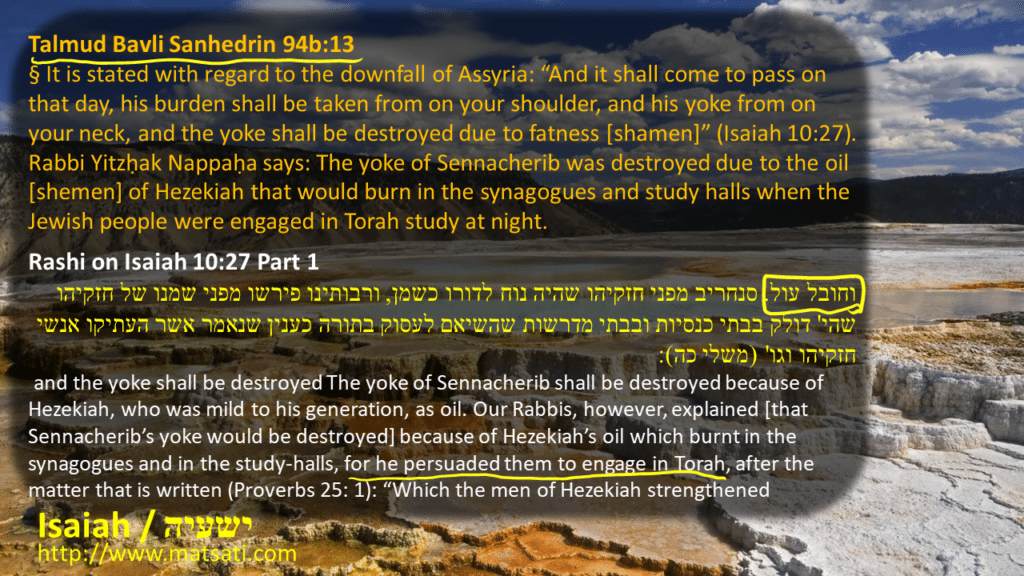
Talmud Bavli Sanhedrin 94b:13
§ It is stated with regard to the downfall of Assyria: “And it shall come to pass on that day, his burden shall be taken from on your shoulder, and his yoke from on your neck, and the yoke shall be destroyed due to fatness [shamen]” (Isaiah 10:27). Rabbi Yitzḥak Nappaḥa says: The yoke of Sennacherib was destroyed due to the oil [shemen] of Hezekiah that would burn in the synagogues and study halls when the Jewish people were engaged in Torah study at night.
Rashi on Isaiah 10:27 Part 1
וחובל עול. סנחריב מפני חזקיהו שהיה נוח לדורו כשמן, ורבותינו פירשו מפני שמנו של חזקיהו שהי’ דולק בבתי כנסיות ובבתי מדרשות שהשיאם לעסוק בתורה כענין שנאמר אשר העתיקו אנשי חזקיהו וגו’ (משלי כה):
and the yoke shall be destroyed The yoke of Sennacherib shall be destroyed because of Hezekiah, who was mild to his generation, as oil. Our Rabbis, however, explained [that Sennacherib’s yoke would be destroyed] because of Hezekiah’s oil which burnt in the synagogues and in the study-halls, for he persuaded them to engage in Torah, after the matter that is written (Proverbs 25: 1): “Which the men of Hezekiah strengthened”
Both Rashi and the Talmudic approach to understanding these verses is that when the people were engaged in studying God’s Word the destruction that was coming stayed and did not harm the people. Hezekiah’s oil is synonymous to his being anointed by God to lead his people to seek the Lord God in heaven. Hezekiah functioned as a messianic figure as king over Israel. This means that Hezekiah led the people to seek the truth of God according to His Word. Truth is an all-encompassing word. Therefore, it is something to be put into practice. There is nothing in our lives that is exempt from truth (אֱמֶת). Note the letters in this world consist of the first, middle, and last letters in the Hebrew alphabet. This reveals to us how truth is all encompassing and enduring from the beginning, the present, and the end! Notice how if we remove the first letter א (aleph) from the word we get מת, death. This is the opposite of life, and also reveals to us how truth is life, whereas if we tamper with the truth, this leads to death. So, if we try to suppress the truth of God and His Holy Word in our lives, in our understanding, all we end up with is death! We also note the NT descriptions of Yeshua. The Messiah is called the Aleph and the Tav (הָאָלֶף וְהַתָּו), “the first and the last” (הָרִאשׁוֹן וְהָאַחֲרוֹן). These are divine titles that exclusively belong to HaShem (see Isaiah 41:4, 44:6, 48:12) and the Messiah of God (see Revelation 1:17-18, 22:13). The basic premise that we obtain from these things is that in order to have life, we must have the Messiah, we cannot remove Him from the equation, this is the truth אֱמֶת of God. Truth is a way of living, a mode of existence before God, and is based upon the Word of God. The Truth of God is what becomes a part of our lives when we live our lives according to God’s Word! This is why our faith is always coupled to being faithful, the way we live our lives before the Almighty God!
